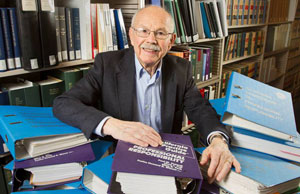Lawyer who pioneered legal ethics tools to be honored
By Amy Yarbrough
Staff Writer
Preeminent. A mentor. “Dean” of legal ethics in California.
Those were but a few words supporters used to describe
attorney Paul W. Vapnek recently when they nominated him for the Harry B.
Sondheim Professional Responsibility Award. An intellectual property attorney
who has devoted more than 40 years to legal ethics, Vapnek is only the second
lawyer to receive the award, which will be presented at the 2013
Annual Statewide Ethics Symposium on April 20.

Vapnek, 84, is modest about the honor, explaining that his
commitment to the field of ethics stems from the fact that “I really enjoy the
work.”
“I have played it down, if you will, but all my colleagues
have said, ‘that’s wonderful,’” Vapnek said. “I have never done what I did
seeking recognition. But it’s wonderful to be recognized for your
achievements.”
Established to recognize an outstanding long-term
contribution to advancing professional responsibility standards in California, the
Sondheim award is given every three years. Recipients are chosen based on a
combination of career achievements such as: at least 15 years practicing law in
California, service on a county bar or specialty bar’s ethics committee, experience
teaching professional responsibility to students, and extensive writing and
continuing education presentations on professional responsibility.
Jerome Sapiro, Jr., one of two attorneys who nominated
Vapnek, called him a person of integrity and said it is clear Vapnek “takes
pride in our profession.”
“He is personally concerned with the professionalism of the
practice of law and wants to improve the quality of the practice of law,”
Sapiro said, “and is tireless in his efforts to improve the profession.”
Though an expert in the Rules of Professional Conduct
himself, attorney Kurt Melchior said at times he needs a third-party opinion
and won’t hesitate to consult Vapnek.
“He is simply universally knowledgeable in this field, very
steady, very informed, and very constructive in his views,” Melchior wrote in a
letter in support of Vapnek’s nomination.
Senior Counsel at Kilpatrick Townsend in San Francisco,
Vapnek practices intellectual property, copyright and trademark law. He has
chaired the legal ethics committee of the Bar Association of San Francisco and
the State Bar’s Committee on Professional Responsibility and Conduct and has
represented clients in disciplinary cases.He was one of the original members of the Bar’s Commission for the Revision of the Rules of Professional Conduct, which led to the Supreme Court’s adoption of new rules in 1989 and adoption of further revisions in 1992.
Vapnek is also credited for starting
the process that led to the creation of the California Compendium on
Professional Responsibility, serving as its first editor in chief. Published by
the State Bar for more than 30 years, the compendium is considered an important
resource on legal ethics. Vapnek is also a co-author of the Rutter Group’s California
Practice Guide on Professional Responsibility, another key tool for California
lawyers.
Vapnek said he enjoys knowing that he is helping attorneys
find answers which “aren’t always crystal clear in the ethics field.”
“It’s gratifying when they talk to me and say, ‘God, we use
your book all the time,” he said.
In addition to contributing to books, Vapnek helped obtain
funding from what was then known as the Board of Governors to establish the
State Bar’s Ethics Hotline in 1983. Shut down for a short time following the
funding crisis in 1998, the service remains one of the State Bar’s most popular
attorney resources. Staffed weekdays, the hotline helps lawyers resolve their ethical
questions by referring them to statutes, rules,
cases, and bar opinions.
Harry Sondheim, who in 2010 was the first recipient of the
award named after him, noted in his letter of support that by working with
Vapnek over the years on various professional responsibility committees, he
came to “realize what an asset Paul is in the field of legal ethics.”
“He consistently provided both excellent work product and
well thought out guidance to each of these groups, thereby demonstrating how
knowledgeable he is in the field of ethics and how he applies his knowledge for
the betterment of the bar, while also giving appropriate weight to the needs of
our clients,” Sondheim wrote.
What’s more, Sapiro said, Vapnek “gives of himself.” He
cited as an example several years ago where Sapiro was supposed to lead a continuing legal education session on ethics but ended up having to back out at
the last minute because of illness. Rather than see it canceled, Vapnek
volunteered to fill in.
“He’ll talk to lawyers’ groups. He’ll talk with the public,
law students, people who are interested in learning the ethics of our profession,”
Sapiro said. “I don’t know anyone who can’t say ‘I respect Paul.’”